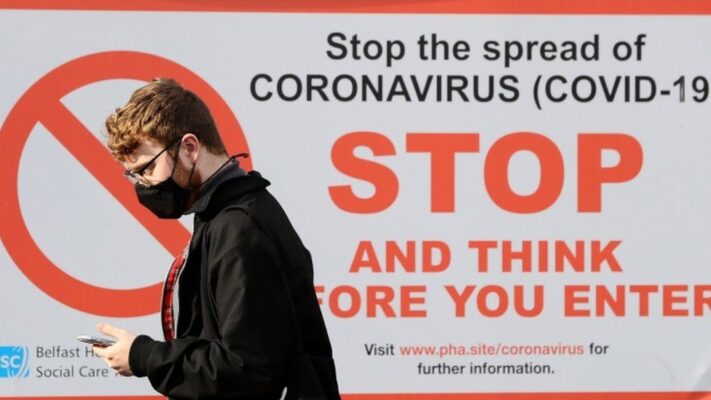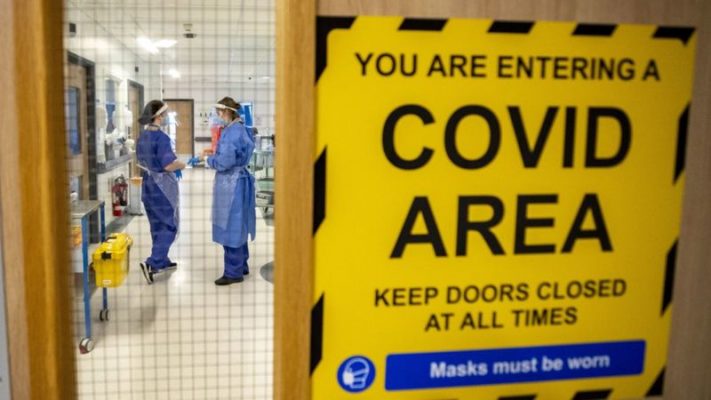 AROUND 50 per cent of Cronavirus cases in the North of Ireland are now linked to the Delta variant.
AROUND 50 per cent of Cronavirus cases in the North of Ireland are now linked to the Delta variant.
BBC News NI reports that scientists believe it will become the dominant strain in the North of Ireland by the end of this month.
About 75 per cent of cases are expected to be linked to the strain, which was first discovered in India.
Sources say there are far too many Covid-19 clusters across the North of Ireland and the Delta variant can only be held back for so long.
The race is now on between variant and the continued vaccination of the public.
Like elsewhere in the UK, the increase in the variant was widely anticipated as the virus continues to mutate so it can survive.
To tackle the rise in cases, mobile vaccine units are expected to be deployed to try and make access to vaccines easier for some groups, especially those aged between 18 and 30.
That may include drop in centres where an appointment is not required.
Mobile units may also be dispatched to large open spaces or university areas where younger people tend are more likely to gather.
Within the past few weeks, mobile vaccination units have opened in Glasgow in Scotland and in Harrogate in England to increase the pace of vaccination, especially in Covid-19 hotspots.
Hospitals in the North of Ireland have yet to be affected.
Latest official figures show there are 13 hospital in-patients being treated for Covid-19, with no cases being treated in intensive care units (ICU) and no one on a ventilator.
However, that picture could change over the next couple of months.
The Department of Health reported 187 new cases on Tuesday – the highest daily total in more than 100 days – with 40 of those in the Derry City and Strabane District Council area.
Over the past seven days there have been a further 280 COVID-19 cases in the Derry and Strabane area.
This means that since the pandemic started in March there have now been 13,250 positive cases within the council boundary – the third highest among all 11 councils in the North.
The rate of infection within the Derry and Strabane Council area has now risen up to 185.8 cases per 100,000, the highest of any council in the North of Ireland.
Health officials believe fewer people are developing serious symptoms because they have been vaccinated.
“The case numbers are going up and we’re seeing that pattern right across the UK but we’re not seeing the rise in serious illness – yet,” said Dr Alan Stout, chair of the Northern Ireland General Practitioners’ Committee (NIGPC).
“We’re not seeing the hospital admissions and we’re not seeing the deaths, so that has shown us that the vaccine is immensely successful in terms of protecting against serious illness.
“We’re hoping – and this is where we need to buy that time over the next week to two weeks and into the early summer – to make sure that those patterns remain.”
Dr Stout added: “We want to force the infect numbers down as well because that has other implications but it is showing us at the moment that the vaccines are working for this particular variant.”
Slightly more people in the over-60s age group are testing positive but the biggest concern is among those aged between 18 and 40.
Official information is not being released about the number of people testing positive after having received two doses of the vaccine but it is understood a small number are affected.
The vaccine does not offer 100% protection against the virus.
But as the Delta variant is causing a spike in cases and increasingly becomes the dominant strain across the UK, experts believe more people who have been fully vaccinated will develop symptoms.
 Judging by the numbers in ICUs across England and Scotland, it is hoped ICU’s in the North of will also not become swamped by seriously-ill people.
Judging by the numbers in ICUs across England and Scotland, it is hoped ICU’s in the North of will also not become swamped by seriously-ill people.
That could change in the autumn and winter months when hospitals will also have to deal with the flu virus and more people experiencing respiratory problems.
The Stormont Executive is due to review lifting further restrictions next Thursday, July 1 with an indicative date of easing on Monday, July 5.
Health officials will want to buy more time in order to get more people vaccinated.
With the Twelfth of July holidays also looming, the preference would be to leave things as they are for another few weeks.
But that could be difficult for some politicians to accept.
Tags:




